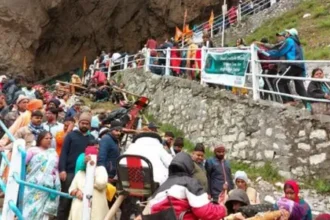Corruption in Kashmir: A Scourge that Hinders Progress
The recent case involving Mohd Shafi Rather, a Class IV employee in Jammu and Kashmir’s Department of Food Civil Supplies & Consumer Affairs, has once again brought to light the pervasive issue of corruption that has plagued the region for decades. The Anti-Corruption Bureau (ACB) has charged Rather with amassing disproportionate assets valued at crores, allegedly through corrupt practices during his tenure as a Kandaman in Baramulla. The investigation revealed a staggering portfolio of assets, including multiple residential properties, significant land investments and luxury expenditures, such as gold ornaments worth Rs 24.10 lakh.
A Legacy of Misgovernance
The pervasive corruption created a trust deficit among the common Kashmiris, who felt disenfranchised and disconnected from the governance process. This sense of alienation was particularly pronounced among the youth, who had grown disillusioned with the system and were increasingly vulnerable to radicalization.
The lack of opportunities, corruption, and misgovernance had created a fertile ground for terrorist organizations to recruit and lure young Kashmiris into their fold. The resulting militancy further exacerbated the region’s woes, leading to a vicious cycle of violence, instability, and underdevelopment.
The failure to address corruption had far-reaching consequences, undermining the very fabric of Kashmiri society and imperiling the region’s future. The case of Mohd Shafi Rather, a Class IV employee who amassed disproportionate assets through corrupt practices, was a stark reminder of the region’s malaise.
However, with the abrogation of Article 370 in 2019, a new chapter has been opened in Jammu and Kashmir’s history, promising a fresh start and a chance to redeem the region’s lost opportunities. The move has paved the way for greater transparency, accountability, and development, which is expected to restore the trust of the Kashmiri youth in the system and usher in a new era of peace and prosperity.
The ACB has previously uncovered numerous cases of corruption, highlighting the systemic issues within the governance framework. For instance, in 2021, the ACB registered cases against officials across various departments for disproportionate assets and bribery, including a significant case involving a Patwari and several others in the revenue department. These cases underscore a troubling pattern of corruption that has persisted over the years, necessitating urgent intervention.
The Corrosive Impact on Society
Corruption has seeped into every facet of life in Kashmir, from healthcare and education to public works and resource allocation. The diversion of funds meant for development projects has left many communities in dire need, with crumbling infrastructure and limited access to essential services. The lack of transparency and accountability has also fueled a sense of disillusionment among the youth, who see their aspirations for a better future dashed by the greed and misdeeds of those in power.
Government Initiatives to Combat Corruption
In response to the rampant corruption, the Jammu and Kashmir government has initiated several measures aimed at eradicating this deep-rooted issue. One significant step is the launch of the J&K Regular Departmental Action (RDA) portal, developed by Kashmir University. This platform is designed to monitor disciplinary proceedings against government employees accused of corruption, ensuring timely resolutions and preventing data loss regarding disciplinary actions. The portal includes features that generate alerts for delays in proceedings, reinforcing accountability and acting as a deterrent against misconduct.
Furthermore, the government has declared a ‘Bhrashtachar Mukt J&K’ week from September 4-10, 2023, to promote transparent governance and engage citizens in the fight against corruption. This initiative aims to raise awareness and involve local stakeholders in discussions about corruption and governance.
Increased Scrutiny and Accountability
Many such cases of corruption have been uncovered in the past in Jammu and Kashmir, but the abrogation of Article 370 has brought about a significant change. With the implementation of central laws and the involvement of agencies like the Central Bureau of Investigation (CBI), more corrupt individuals are being caught and held accountable. The CBI has registered its first corruption cases in the newly formed Union Territory, signaling a renewed commitment to rooting out graft at all levels of government.
A Call for Change
The ACB’s actions in the Rather case, while necessary, underscore the urgent need for systemic reforms to combat corruption at all levels of government. The invocation of the J&K Public Men and Public Servants (Declaration of Assets & other Provisions) Act 1983 against Rather and the involvement of other officials in his corrupt activities reveal a network of complicity that demands scrutiny. As the investigation unfolds, it is crucial for authorities to address the underlying systemic issues that facilitate such corruption, ensuring accountability and transparency in public service.
Empowering the People
Ultimately, the fight against corruption in Kashmir requires a multi-pronged approach that involves both government action and citizen engagement. By strengthening civil society organizations, promoting civic education, and creating platforms for public participation in decision-making, the government can empower citizens to hold their leaders accountable. This, coupled with a renewed focus on ethical leadership and good governance, can pave the way for a brighter future for Kashmir, one where progress and prosperity are not hindered by the scourge of corruption.
However, Kashmir’s unique geopolitical landscape presents additional challenges. As a sensitive state, it is vulnerable to foreign elements that seek to exploit its instability and promote malpractices, further suffocating its people and perpetuating misgovernance. These external forces often fuel corruption, terrorism, and separatism, making it even more difficult to root out corruption.
To overcome these challenges, stringent efforts are necessary to curb corruption and misgovernance in Kashmir. This requires a comprehensive strategy that addresses both internal and external factors, including:
- Strengthening institutions and ensuring accountability
- Enhancing civic engagement and public participation
- Promoting ethical leadership and good governance
- Countering foreign interference and propaganda
- Fostering a culture of transparency and integrity
By adopting a zero-tolerance approach to corruption and misgovernance, Kashmir can become a symbol of excellence, where its people can thrive and reach their full potential. The government, civil society, and citizens must work together to achieve this vision, ensuring that Kashmir’s future is bright, prosperous, and free from the shackles of corruption.
In conclusion, while the government is making efforts to combat corruption, the road ahead is long and requires sustained commitment and innovative strategies to truly transform the governance landscape in Jammu and Kashmir.







